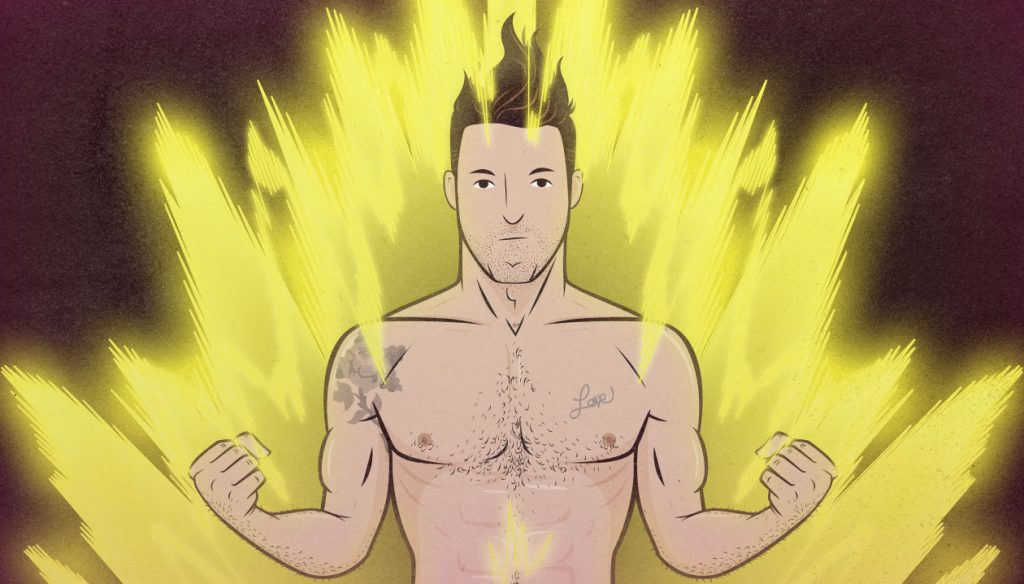
The Skinny Guy’s Guide to Natural Testosterone Production
This is a guest post written by Dr. Robin Bhavsar, a physician with a specialization in urology (the field of medicine concerned with testosterone). He works at St. Joseph Health. You can see his credentials here.
After bulking up with our Bony to Beastly Program, he wrote a guide in our coaching community that became immensely popular with our members. He also answered many of their questions, including ones like:
- Does being skinny mean I have low testosterone?
- Am I skinny-fat because I have low testosterone?
- How can I increase my natural testosterone production?
In this article, Dr. Bhavsar will explain everything a skinny guy should know about their own natural testosterone production.
- Introduction to Dr. Bhavsar
- How a Skinny Urologist Gained 30 Pounds
- Do Skinny & Skinny-Fat Guys Have Low Testosterone?
- How Testosterone Affects Muscle Growth
- Steroids, Bodybuilding & Muscle Growth
- How Testosterone Production Works
- How to Increase Your Natural Testosterone Production
- Common Questions About Testosterone
- How do I find out my level of testosterone?
- What should my testosterone level be?
- Does testosterone go down as I get older?
- Should I work out when my testosterone is at its highest?
- Does taking testosterone build muscle without exercise?
- Does marijuana affect my testosterone levels?
- What about alcohol, caffeine, and cigarettes?
- Can you look like a professional bodybuilder naturally?
- Can testosterone levels increase post-vasectomy?
- Can Carbs Affect Testosterone Production?
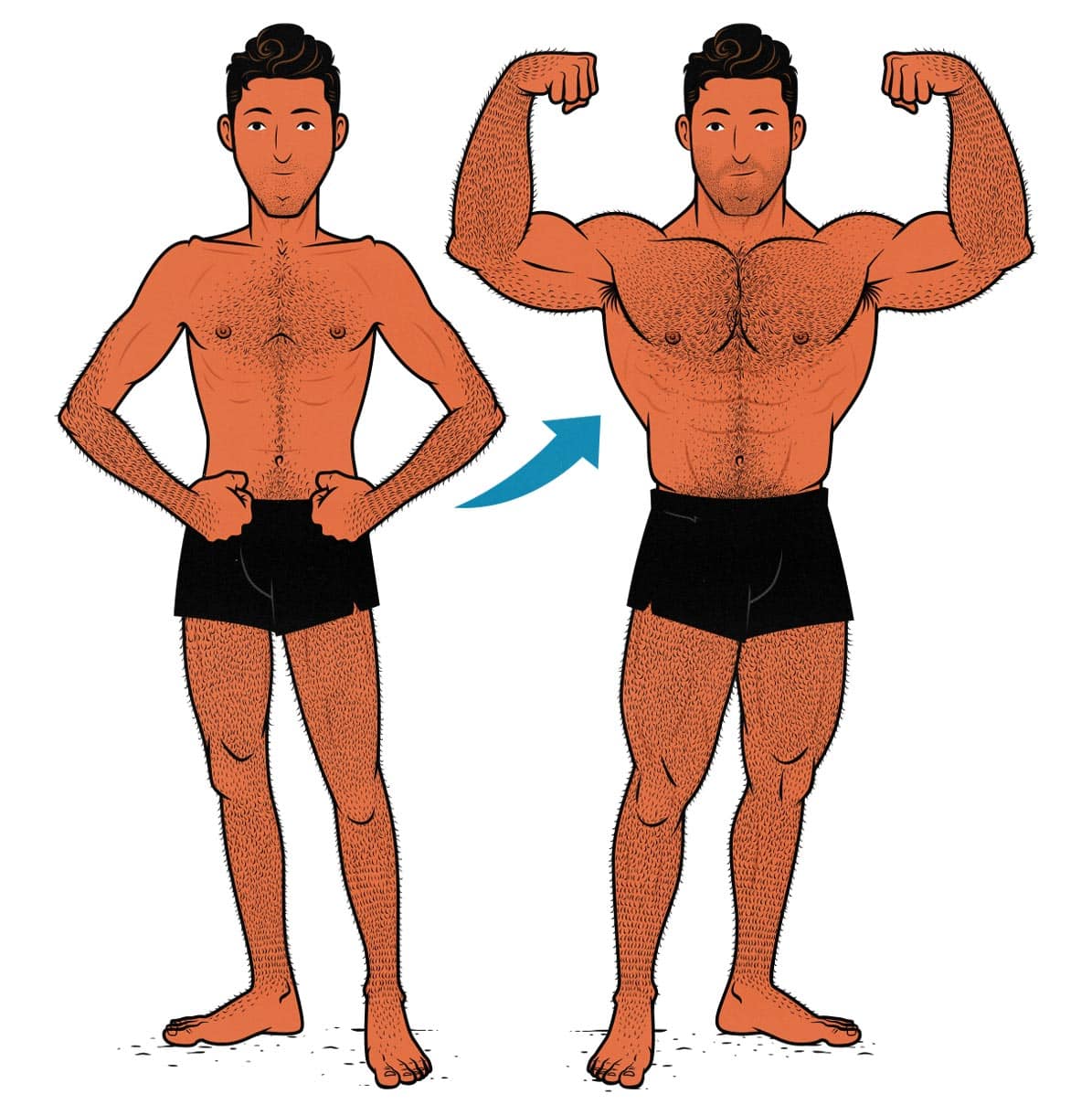
Introduction to Dr. Bhavsar
Hey, all. I’m going to be making a lot of gross simplifications to keep this easy to follow and useful for you guys. That said, I have a fair amount of knowledge in this area. I’m by no means the definitive resource, as I’m constantly learning about new things. Still, I have studied testosterone extensively as a urologist and have a lot of experience doing testosterone replacement therapy for my patients.
As a urologist, I got quite a bit of general medical training, and also more specifically about testosterone. The greatest thing that helped me build muscle was discipline, but it still helped to know how to improve my testosterone naturally.
How a Skinny Urologist Gained 30 Pounds
I was skinny my entire life. 5′ 10″ and fluctuating between 125 to 130 pounds. For most of high school, I was around 120 lbs.
I really wasn’t happy with the way I looked, but I used to believe that no one could change their body shape. That it was primarily determined by genetics, and there was little one could do about it. I always thought bodybuilding was for those “big guys” I saw, and that I could never do that.
After medical school, I learned all about the physiology of metabolism, weight gain, and the obesity epidemic in this country (USA) and many others. This was always changeable. If obese people can lose weight, even against impossible odds, then why couldn’t I gain weight?
But even with the knowledge that I could change my body type, I still struggled.
Sometime later, during one of my short-lived periods of motivation, I stumbled across this website. I don’t know what it was, but everything clicked. The people who created this website, being former skinny guys themselves, seemed to hit every nail regarding the struggle that I had gone through and how I felt. After reading almost all of their free content, I decided to go ahead and buy the program. Then I read the entire eBook. Twice.
By this point in my life, I was a newly practicing physician with 2 small children at home. Going to the gym wasn’t feasible, so I brought the gym home by making my own. I started with 1 set of adjustable-weight dumbbells (5-52.5 pounds), a pull-up bar, and a bench. I completed all 4 phases of the program with just these 3 things.
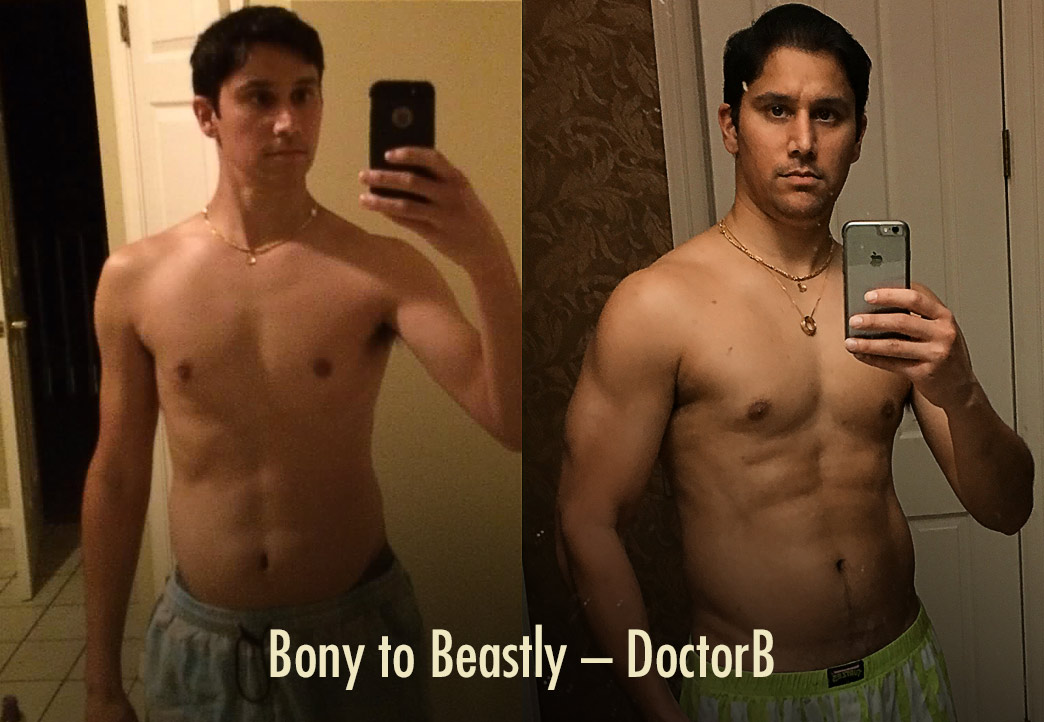
At the end of the Bony to Beastly Program, I weighed in at around 160 pounds or so. I cut afterwards and then bulked again, and just finished another cut to get rid of some excess body fat.
Do Skinny & Skinny-Fat Guys Have Low Testosterone?
There is no relation between being skinny and having low testosterone unless there are other medical conditions at play. If anything, the opposite is true. Fat cells convert testosterone to estrogen. Therefore, obese people tend to have lower testosterone levels and higher estrogen levels.
Skinny people tend to have fairly healthy testosterone levels. Not necessarily higher, per se, but normal. The main benefit skinny people have is that with their normal testosterone, they are in good shape to build muscle. With their naturally high metabolisms, they are usually able to do so quite leanly.
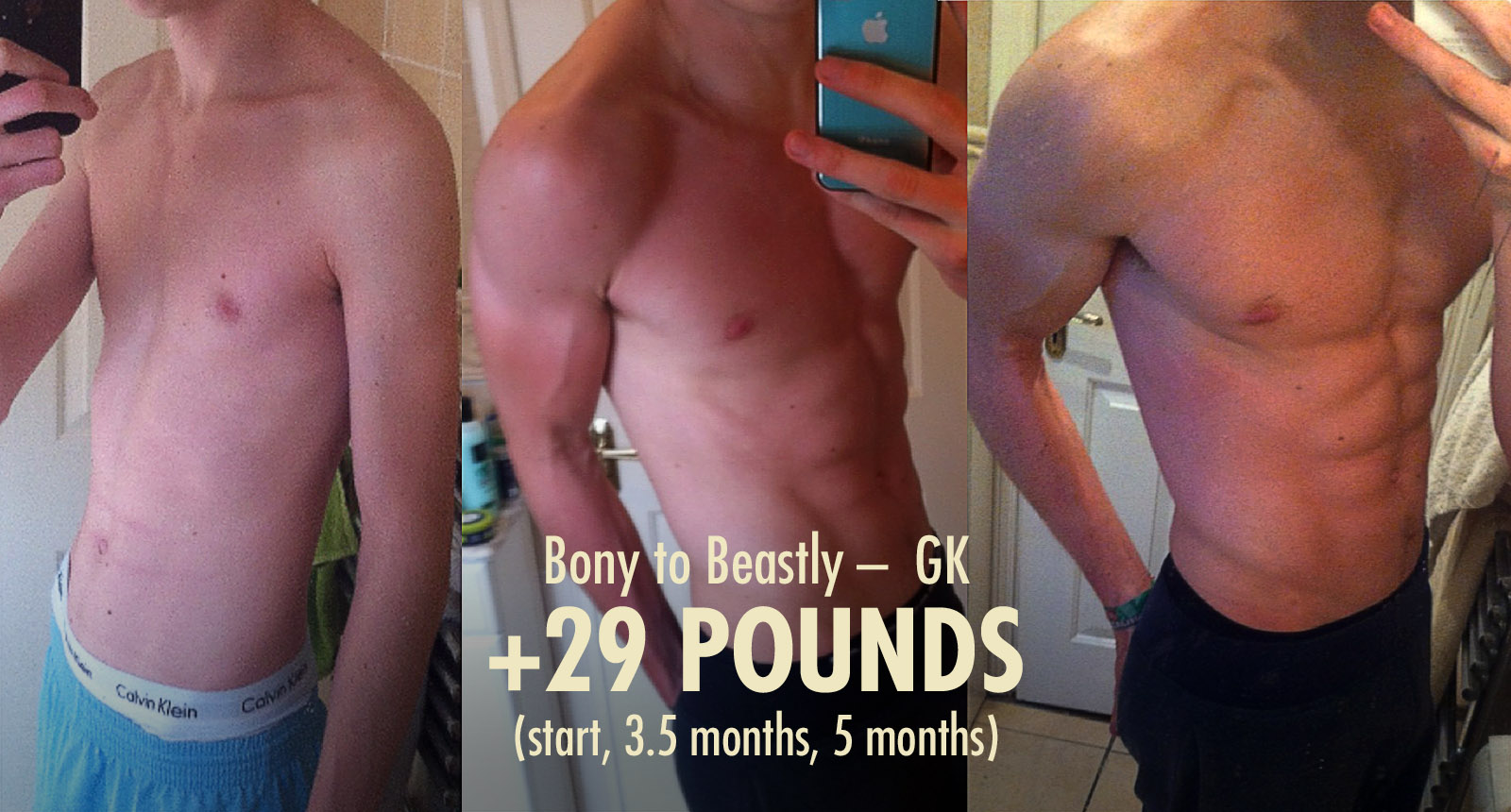
Case in point, me. I had high testosterone during puberty but was skinny as a twig. I also never did any weight-bearing exercises and ate like a mouse. Had I done the right things, my high testosterone production could have helped me build muscle more easily.
The same is true with most skinny people. Many skinny guys have high testosterone and are in a good position to build muscle.
How Testosterone Affects Muscle Growth
Testosterone itself is a steroid. In men, 90% of testosterone production is generated by the testicles and 10% by the adrenal glands. It plays a lot of critical roles in both men and women and is an essential hormone in both, but obviously, it does more in men and is needed in greater quantities. Here, I’ll just go over how testosterone affects men.
Testosterone is associated with the following benefits:
- More lean muscle mass.
- Less body fat.
- Greater bone density.
- Increased metabolism.
- Increased memory.
- Higher libido.
- Assists in spermatogenesis.
- Slight improvement in lipid profile: lowers LDL and raises HDL.
- Assists in expressing male genetic traits: facial hair, body and pubic hair, baldness, and prostate growth.
Symptoms of low testosterone include:
- Low libido.
- Less energy.
- Loss of appetite.
- Loss of muscle.
- Difficulty maintaining muscle.
- Decreased concentration.
- Erectile dysfunction.
- Infertility.
- Fat gain.
- Fatigue.
If a person has low testosterone, the symptom that is by far the most common is a low libido.
A lot of my patients want to know if they should be on testosterone because they suspect their testosterone levels are low. As physicians, we don’t treat the number; we treat the symptoms. So if someone has low T but no symptoms, we will often discourage treatments, but if these symptoms are also present, we may treat them with testosterone.
Steroids, Bodybuilding & Muscle Growth
As a beginner, building muscle is relatively quick and easy with or without steroids. Over time, progressing becomes slower and harder. Eventually, if training and diet are good enough, people reach their genetic ceiling.
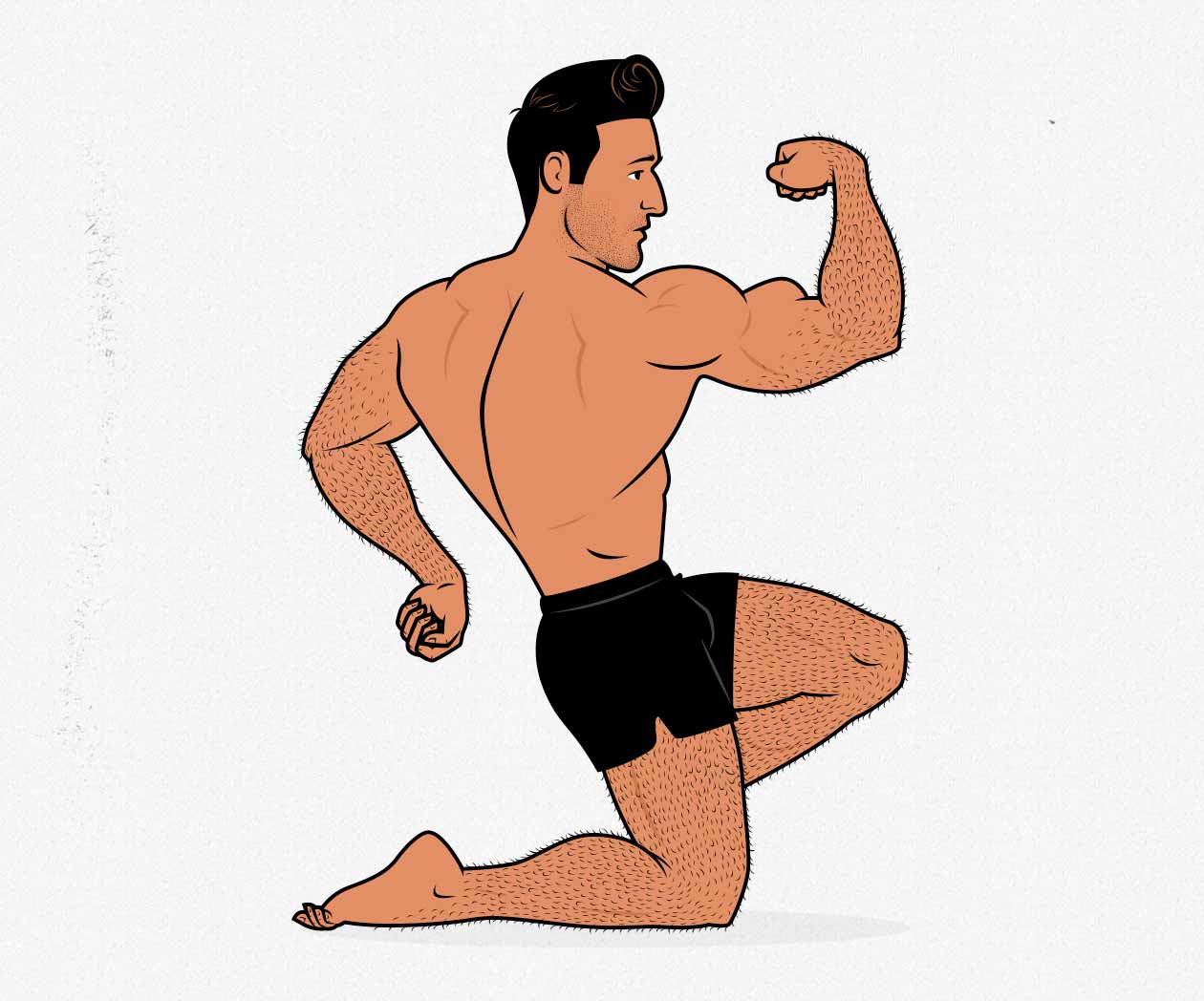
One of the ways that a body limits growth is by regulating how much testosterone it will release. By using testosterone, one can blow way past one’s genetic potential by increasing the rate at which muscle fibres can pull in new myonuclei from satellite cells (more on that here). Calories are then directed into the muscles to feed this growth. Taking testosterone also greatly diminishes the time needed for recovery, allowing people to work out far more frequently. All of this speeds up muscle growth while reducing fat accumulation.
However, there are several adverse side effects to taking testosterone, and people who take testosterone for bodybuilding often do so with illegally acquired testosterone products and little to no knowledge of what it will do to them.
The side effects of testosterone use are not inconsequential:
- A lifelong dependency on testosterone (screwing up your hormones permanently).
- Increased risk of breast development and tenderness.
- Increased risk of blood clots and pulmonary embolisms.
- Increased risk of strokes and heart attacks.
- Higher risk for prostate enlargement.
- Structural changes in the heart.
- Fluid retention and swelling.
- Infertility.
- Acne.
Also, when people start testosterone, they usually end up on it for life.
How Testosterone Production Works
When the brain sees that our testosterone is getting low, it produces luteinizing hormone, signalling the testicles to produce more testosterone. Then, when testosterone levels start getting high, it stops the production of luteinizing hormone, telling the body to stop testosterone production. This maintains balance.
If a person takes testosterone, the brain thinks plenty is being produced and cuts back on luteinizing hormone production. However, testosterone levels don’t go down because the testosterone is being given externally. Luteinizing hormone production then drops to almost zero, which still has no balancing effect.
Over the course of a few months, the testicles begin to shrink and stop producing both sperm and testosterone. This is reversible in the short term, but the longer one continues to use testosterone, the more permanent it becomes, eventually causing permanent infertility and permanent cessation of the body’s ability to make its own testosterone. At that point, the person is nearly sterile and will be reliant on external testosterone forever.
When taking testosterone for bodybuilding, it must be cycled to minimize the effects of shutting down natural testosterone production. (I am not going to detail how to cycle it because I don’t want people trying to do it on their own. Remember, this guide leaves a lot of details out and grossly oversimplifies things.)
Overall, I don’t recommend using testosterone for bodybuilding. You can build muscle without it. Besides, the Bony to Beastly program already has great tips to assist in boosting testosterone production naturally.
For those who want more, I would consider using an herbal testosterone booster like ashwagandha, which may help with natural testosterone production in the body (study), or Tribulus, which may increase your libido.
If you still want to use external testosterone, it would be best done under a physician’s guidance to monitor labs and ensure safety. Doing it on your own can have serious health consequences.
How to Increase Your Natural Testosterone Production
People can significantly increase their testosterone by improving their lifestyles. I have seen people raise their testosterone from 260 (low) to 550 (normal), and others go from low normal (350 or so) to high (800) just through lifestyle changes. This is something you can do on your own.
Multiple factors can lower testosterone production, so the first step is to ensure you aren’t unnecessarily limiting your testosterone. Here are some common examples of factors that limit testosterone production:
- Being overweight.
- Being overly sedentary.
- Prior testosterone abuse.
- Using prescription narcotics.
- Eating a poor diet.
- Having diabetes.
- Illness.
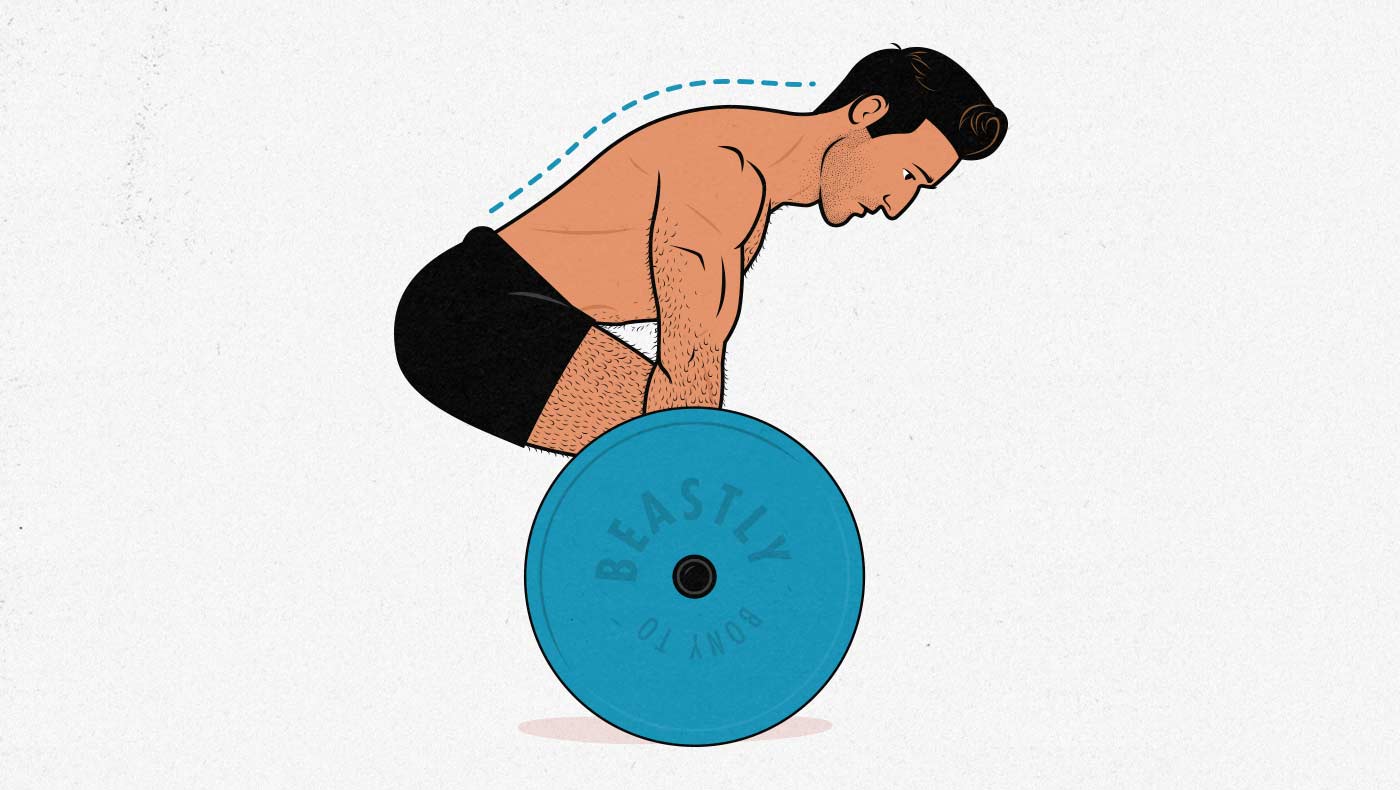
The 3 pillars of raising testosterone naturally revolve around lifting heavy things, eating healthy, and getting adequate sleep.
The Bony to Beastly program will help with lifting and eating, and to help improve your sleep, I wrote a guide for Beastly members in the community. You can read a free article here.
Trying to raise testosterone naturally doesn’t always work, but I have seen plenty of cases of people raising their testosterone significantly on their own. It’s not a bad idea to see a doctor to make sure any other factors are properly treated.
Common Questions About Testosterone
Some of these are common testosterone questions from patients; others come from members of the Beastly community.
How do I find out my level of testosterone?
See your GP and ask for a blood draw. Testosterone levels should be drawn between 6 AM and 10 AM, when testosterone is at it’s natural highest levels.
What should my testosterone level be?
A normal testosterone level is between 350 ng/dl and 700 ng/dl for most adults. Between 700 and 1500 ng/dl is considered high testosterone and is usually seen in teenagers undergoing puberty. Over 1500 ng/dL is generally considered supraphysiologic and is usually not achievable unless someone is using pharmaceutical testosterone or has a testosterone-producing tumour.
Remember that we tend to treat people with low testosterone only if they also have symptoms.
Testosterone circulates in 3 forms in the body. It can be bound to sex hormone-binding globulin (SHBG), albumin, or in free form. The testosterone measurements you would get from a standard lab test would measure all of these together. Interestingly, only a portion of it is actually available to the body. None of the testosterone bound to SHBG is available, about 20% of that bound to albumin is available and all of the free testosterone is available. 60-70% of testosterone circulates bound to SHBG, roughly 25% circulates bound to albumin, and just the remaining few percents are free testosterone.
In medicine, we only care about available testosterone, and it is very hard to measure reliably. Furthermore, no established normals have been set for bioavailable testosterone. This is why some people can have borderline low testosterone, feel just fine, have a good libido, be muscular, and have no issues packing on more muscle.
Does testosterone go down as I get older?
Yes and no. Yes, testosterone goes down with age. A 40-year-old will not have the same testosterone as a 20-year-old. However, much of the testosterone decline is attributable to decreased physical activity and weight-bearing exercise, increased fat, and a more sedentary lifestyle. Following b2B or another active lifestyle into middle age will allow you to retain a relatively high testosterone level late into life, and one can maintain a high level of muscle mass, or even build muscle, at any age.
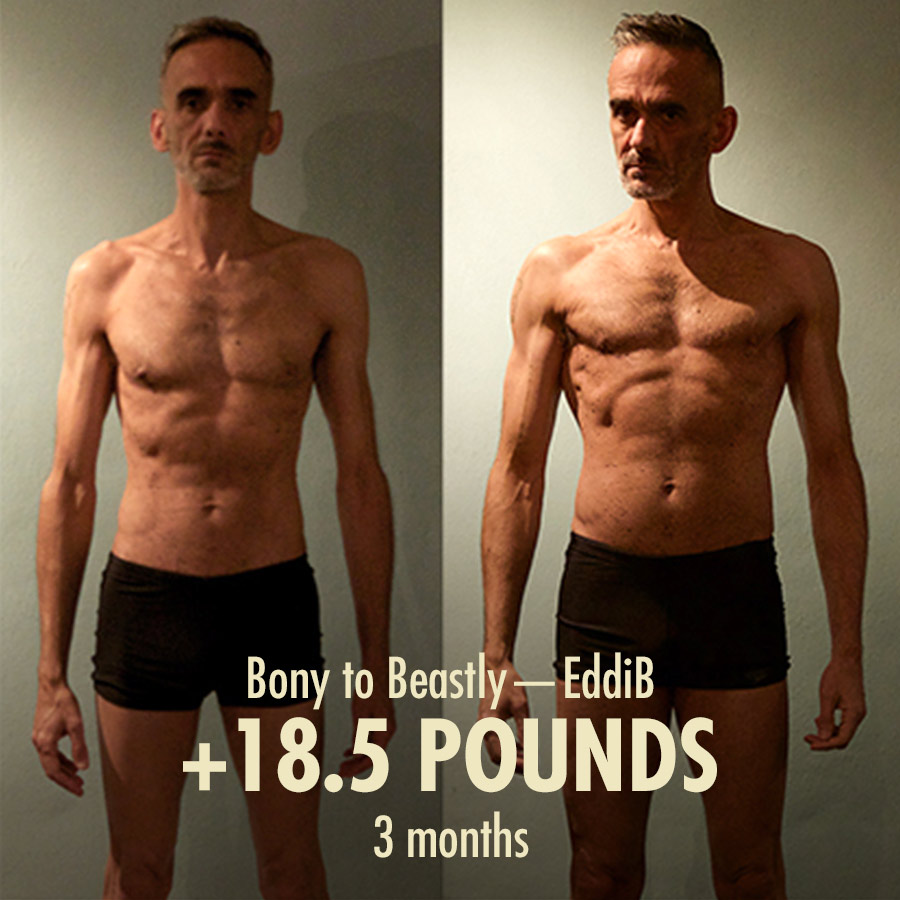
Should I work out when my testosterone is at its highest?
No. Work out whenever you want. Testosterone goes up and down throughout the day. What matters is your overall level of testosterone, not hourly fluctuations. Your body is equipped to build muscle at any time of day, provided you get enough to eat and get a good night’s sleep. The daily circadian rhythms in your body have no bearing on when is the best time to work out.
Does taking testosterone build muscle without exercise?
Yes, but with an important caveat. While it is true that boosting testosterone to supraphysiological levels can cause fat loss and muscle growth with zero exercise, the gains are not that significant. Once body fat stores get low enough, muscle growth will stop without a caloric surplus. Also, without exercise, a lot of that excess testosterone will begin to get converted to estrogen since it isn’t being used, putting one at risk for all sorts of adverse side effects.
Does marijuana affect my testosterone levels?
A: This is a tricky one. The short answer is yes, it can. The long answer is that it depends on a lot of factors. Light marijuana use has never been shown to affect testosterone use. Moderate to heavy THC levels in lab animals can cause significant testosterone and estrogen problems, but this doesn’t seem to correlate well with humans.
It appears that some humans can smoke a ton of MJ with no ill effects on their hormones, and others can start to develop estrogen excess and testosterone deficiencies. A lot of this seems to be genetic, but the jury is still somewhat inconclusive on this.
What about alcohol, caffeine, and cigarettes?
A few other things can cause low testosterone, notably chronic narcotic use (like Vicodin, Percocet, etc), and alcohol abuse (not just drinking once in a while at bars). Cigarettes can affect sperm counts, but it hasn’t really been associated with low testosterone.
Can you look like a professional bodybuilder naturally?
There may be truth to this, but a lot depends on your genetics. Those with North African, Nordic or German heritage seem to have a better genetic ability to become massive, whereas Asians seem to have a harder time getting huge. Obviously, there are plenty of exceptions. The reality is, yes you can get huge on your own, but your definition of what defines being huge depends largely on your perception. To become ridiculously large, oftentimes some type of hormone manipulation is necessary.
Can testosterone levels increase post-vasectomy?
Yes, testosterone levels can elevate some after a vasectomy, but this is a statistical finding, not a clinical one. In other words, the number is higher, but not enough to mean anything relevant for your body. Usually, changes over 150 ng/dL are needed before clinical changes become apparent.
Can Carbs Affect Testosterone Production?
Carbs are considered essential for the production of testosterone, and low-carb diets have been linked to lower free testosterone (study). So quite the opposite, generally.
Specifically, there’s a study where athletes undergoing high-stress activities like exercise showed lower testosterone and higher cortisol levels when training in a carb-deficient state (study). So I’m not sure that you would want to avoid carbs. Maybe refined sugars, but not carbs altogether.

